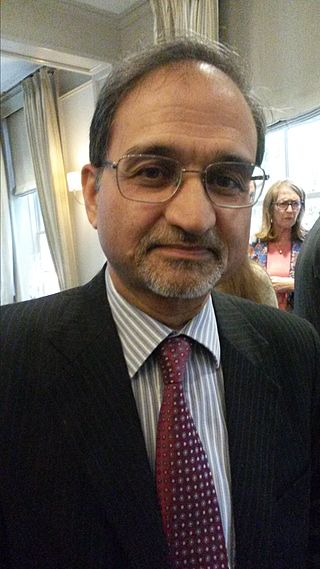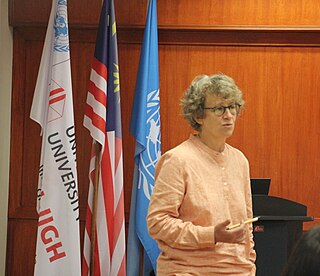
Anxiety disorders are a group of mental disorders characterized by significant and uncontrollable feelings of anxiety and fear such that a person's social, occupational, and personal functions are significantly impaired. Anxiety may cause physical and cognitive symptoms, such as restlessness, irritability, easy fatigue, difficulty concentrating, increased heart rate, chest pain, abdominal pain, and a variety of other symptoms that may vary based on the individual.
Derek Summerfield is an honorary senior lecturer at London's Institute of Psychiatry and a member of the Executive Committee of Transcultural Special Interest Group at the Royal College of Psychiatry. He is also an Honorary Fellow of the Egyptian Psychiatric Association. He has published around 150 papers and has made other contributions in medical and social sciences literature.
Child psychotherapy, or mental health interventions for children refers to the psychological treatment of various mental disorders diagnosed in children and adolescents. The therapeutic techniques developed for younger age ranges specialize in prioritizing the relationship between the child and the therapist. The goal of maintaining positive therapist-client relationships is typically achieved using therapeutic conversations and can take place with the client alone, or through engagement with family members.
Child and adolescent psychiatry is a branch of psychiatry that focuses on the diagnosis, treatment, and prevention of mental disorders in children, adolescents, and their families. It investigates the biopsychosocial factors that influence the development and course of psychiatric disorders and treatment responses to various interventions. Child and adolescent psychiatrists primarily use psychotherapy and/or medication to treat mental disorders in the pediatric population.
Youth suicide is when a young person, generally categorized as someone below the legal age of majority, deliberately ends their own life. Rates of youth suicide and attempted youth suicide in Western societies and other countries are high. Among youth, attempting suicide is more common among girls; however, boys are more likely to actually perform suicide. For example, in Australia suicide is second only to motor vehicle accidents as its leading cause of death for adolescents and young adults aged 15 to 25.

Vikram Harshad Patel FMedSci is an Indian psychiatrist and researcher best known for his work on child development and mental disability in low-resource settings. He is the Co-Founder and former Director of the Centre for Global Mental Health at the London School of Hygiene and Tropical Medicine (LSHTM), Co-Director of the Centre for Control of Chronic Conditions at the Public Health Foundation of India, and the Co-Founder of Sangath, an Indian NGO dedicated to research in the areas of child development, adolescent health and mental health. Since 2024, he has been the Paul Farmer Professor and Chair of the Department of Global Health and Social Medicine at Harvard Medical School in Boston, where he was previously the Pershing Square Professor of Global Health and Social Medicine. He was awarded a Wellcome Trust Principal Research Fellowship in 2015. In April 2015, he was listed as one of the world's 100 most influential people by TIME magazine.

Shekhar Saxena, MD, FRCPsych, DAB, MRC, Psych, since 1998 has worked at the World Health Organization (WHO) and since 2010 has been the Director of the Department of Mental Health and Substance Abuse (MSD) at World Health Organization's Headquarters Office in Geneva, Switzerland. He is recipient of the 2017 Leon Eisenberg Award. In September 2018 joined the Harvard T.H. Chan School of Public Health as visiting professor of Global Mental Health in the Department of Global Health and Population.
Prevention of mental disorders are measures that try to decrease the chances of a mental disorder occurring. A 2004 WHO report stated that "prevention of these disorders is obviously one of the most effective ways to reduce the disease burden." The 2011 European Psychiatric Association (EPA) guidance on prevention of mental disorders states "There is considerable evidence that various psychiatric conditions can be prevented through the implementation of effective evidence-based interventions." A 2011 UK Department of Health report on the economic case for mental health promotion and mental illness prevention found that "many interventions are outstandingly good value for money, low in cost and often become self-financing over time, saving public expenditure". In 2016, the National Institute of Mental Health re-affirmed prevention as a research priority area.

Terry M. McGovern is an American public health scholar. She is the Senior Associate Dean for Academic and Faculty Affairs at CUNY Graduate School of Public Health & Health Policy in New York City. McGovern is also Professor of Health Policy and Management.
Edmund James Stephen Sonuga-Barke,, is a developmental psychologist and academic. He has held professorships at King's College London and the University of Southampton (1997–2017).

Irene Mary Carmel Tracey is Vice-Chancellor of the University of Oxford and former Warden of Merton College, Oxford. She is also Professor of Anaesthetic Neuroscience in the Nuffield Department of Clinical Neurosciences and formerly Pro-Vice-Chancellor at the University of Oxford. She is a co-founder of the Oxford Centre for Functional Magnetic Resonance Imaging of the Brain (FMRIB), now the Wellcome Centre for Integrative Neuroimaging. Her team’s research is focused on the neuroscience of pain, specifically pain perception and analgesia as well as how anaesthetics produce altered states of consciousness. Her team uses multidisciplinary approaches including neuroimaging.

Tamsin Jane FordCBE, FRCPsych, FMedSci is a British psychiatrist specialising in children's mental health. Since 2019 she has been based at the University of Cambridge where she is now Professor of Child and Adolescent Psychiatry, Head of the Department of Psychiatry and Fellow of Hughes Hall. She has been heavily involved with the Incredible Years Teacher Classroom Management (TCM) programme, created by Carolyn Webster-Stratton, which aims to raise and improve children's mental health in primary schools across Devon. Her work also ties in with the Strengths and Difficulties Questionnaire (SDQ), created by UK psychiatrist, Robert Goodman.
Helen Minnis is a Professor of Child and Adolescent Psychiatry at the University of Glasgow. She studies reactive attachment disorder and other developmental conditions.
Russell Mardon Viner, FMedSci is an Australian-British paediatrician and policy researcher who is Chief Scientific Advisor at the Department for Education and Professor of Adolescent Health at the UCL Great Ormond Street Institute of Child Health. He is an expert on child and adolescent health in the UK and internationally. He was a member of the UK Government's Scientific Advisory Group for Emergencies (SAGE) during the COVID-19 pandemic and was President of the Royal College of Paediatrics and Child Health from 2018 to 2021. He remains clinically active, seeing young people with diabetes each week at UCL Hospitals. Viner is vice-chair of the NHS England Transformation Board for Children and Young People and Chair of the Stakeholder Council for the Board. He is a non-executive director (NED) at Great Ormond St. Hospital for Children NHS Foundation Trust, also sitting on the Trust's Finance & Investment and the Quality and Safety sub-committees.

Anat Brunstein-Klomek is an Israeli psychologist. She is an associate professor at the Interdisciplinary Center Herzliya and holds an adjunct position at the New York State Psychiatric Institute. Her research focuses on depression, suicide and bullying.
Claudi Bockting is a Dutch clinical psychologist and Professor of Clinical Psychology in Psychiatry at the University of Amsterdams Faculty of Medicine, Amsterdam University Medical Centers. Her research program focuses on identifying etiological factors of common mental health disorders such as depression, anxiety disorders and substance abuse, and developing evidence-based psychotherapeutic interventions.

Amy Orben is a British experimental psychologist who is a group leader at the MRC Cognition and Brain Sciences Unit. Her research considers how digital technologies impact adolescent mental health. Orben was awarded the British Neuroscience Association Researcher Credibility Prize in 2021 and the inaugural Medical Research Council Impact Prize in 2023.

Nina Schwalbe is an American public health researcher who is the founder of Spark Street Advisors, a public health think tank based in New York City. Schwalbe specializes in vaccines. She has previously worked at Gavi, UNICEF and USAID.

Jessica Schleider is an American psychologist, author, and an associate professor of Medical Social Sciences at Northwestern University. She is the lab director of the Lab for Scalable Mental Health.

Roz Shafran is a British consultant clinical psychologist who is Professor of Translational Psychology at the UCL Great Ormond Street Institute of Child Health. She is particularly known for her pioneering research on perfectionism and its effects on mental health, as well as her leadership in creating and directing the Charlie Waller Institute.











